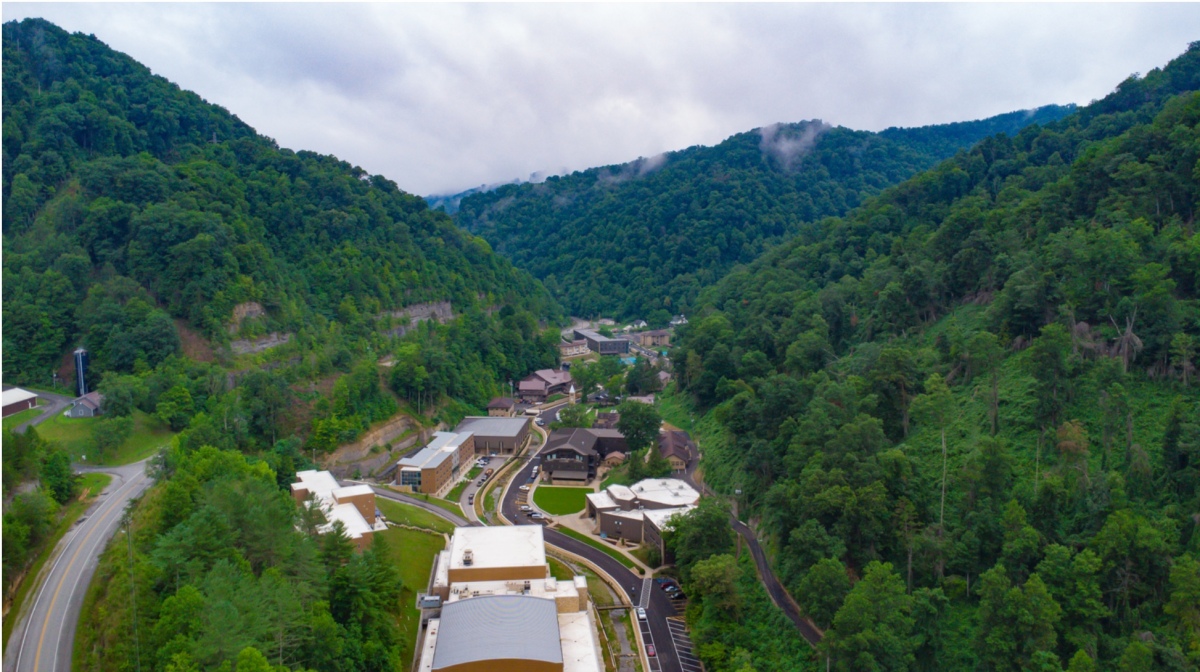March 24, 2025, by Dean Hoke: Each small college has something special about it. Alice Lloyd College in Pippa Passes, Kentucky, was founded by Alice Spencer Geddes Lloyd and June Buchanan. They established the school in 1923 with minimal funds to provide affordable, quality education for Appalachian students facing economic hardship and limited educational opportunities. Their pioneering vision continues today, empowering students to become leaders dedicated to serving their Appalachian communities. This profile of Alice Lloyd College is the seventh in a series presenting small colleges throughout the United States.
Background
Established in 1923, Alice Lloyd College (ALC) is a private liberal arts college located in Pippa Passes, Kentucky, in the heart of Appalachia. The campus occupies approximately 175 acres in a picturesque mountain valley, offering an idyllic rural setting. Alice Spencer Geddes Lloyd (1876 – 1962) and her co-founder June Buchanan (1887 – 1988) were the co-founders and worked without pay on both education and fundraising for the college.
The school was created to provide post-secondary educational opportunities to serve students from Appalachia; the college remains steadfastly committed to its original mission of providing affordable, quality education, especially to students from Kentucky’s Appalachian region. It became a bachelor’s degree-granting institution in the early 1980s. Alice Lloyd College serves almost exclusively a 108-county Central Appalachian service area. Tuition is guaranteed to full-time students residing in the service area.
Alice Lloyd College remains dependent on the private support of the American free-enterprise system for over half of its revenue sources.
Curricula
Alice Lloyd College offers bachelor’s degrees across numerous academic fields, including Biological Sciences, Education, English, History, Sociology, Business Administration, and Criminal Justice. Education remains a cornerstone of ALC, reflecting its historic mission, with notable concentrations in Elementary Education, Secondary Education, and Special Education.
ALC’s distinctive curriculum model is designed around leadership education and character development, which are integral to the college’s foundational philosophy. Alice Lloyd’s Gatton Winston Scholars Program (formerly The Caney Scholars Program) financially supports ALC graduates seeking advanced degrees. It is the only program of its kind in the nation. Applicants must have high academic standards, be of strong character, and show potential for leadership. The College’s “Caney Scholars” program emphasizes leadership, community service, and personal responsibility, complementing traditional liberal arts education.
Strengths
- Tuition Guarantee and Financial Aid: Alice Lloyd College offers free tuition for full-time students residing within its designated service area, making higher education accessible to economically disadvantaged students in Appalachia. This tuition-guarantee policy, funded through endowment revenues and private donations, covers full tuition for eligible students.
- Work-Study Program: Uniquely, all full-time students participate in a mandatory work-study program. This program requires them to contribute labor weekly to campus operations, fostering a strong work ethic, practical experience, and reduced operating costs for the institution. Only seven colleges in the US have such a program.
- High Graduate Success Rates: Nearly 95% of Alice Lloyd graduates secure employment or acceptance to graduate programs within six months of graduation, demonstrating the effectiveness of the College’s rigorous academic and character development programs.
- Leadership and Character Development: A cornerstone of Alice Lloyd College’s educational experience is the emphasis on developing leaders through service learning and character education, which external evaluators consistently recognize as a defining institutional strength.
Weaknesses
- Alice Lloyd College’s student retention and six-year graduation rate is below both national and regional averages for private colleges.
- Financial Dependency on Donations: Alice Lloyd College operates tuition-free for eligible students from its service region, placing considerable reliance on donations, grants, and endowment income. This dependence can pose financial stability risks if philanthropic trends shift negatively.
- Rural Isolation: The College’s isolated location, while picturesque, can deter students seeking urban experiences or greater proximity to metropolitan opportunities, limiting the pool of prospective students to those primarily interested in a rural collegiate experience.
Economic Impact
Alice Lloyd College significantly impacts the economy and social infrastructure of eastern Kentucky. Alice Lloyd College significantly contributes to the local and regional economy, generating $33 million in total economic impact for the Fiscal Year 2021-2022, according to a recent study commissioned by the Association of Independent Kentucky Colleges and Universities. According to Alice Lloyd College President Jim Stepp, “Today, 83% of our alumni live, work, and serve in these mountains and are fulfilling our founders’ vision. Additionally, the college frequently engages in community initiatives, supporting local economic and educational development.
Enrollment
Enrollment at Alice Lloyd College remains stable between 550 and 600, primarily from Appalachia. However, recent years have seen an uptick in applications from outside the immediate region due to increased awareness of its distinctive tuition-free and work-study models. Key points:
- The acceptance rate in Fall 2023 is 86%—source: National Center for Education Statistics.
- 48% of graduates are first-generation, 4-year college graduates.
- 98% of their students come from the 108-county Appalachia Region.
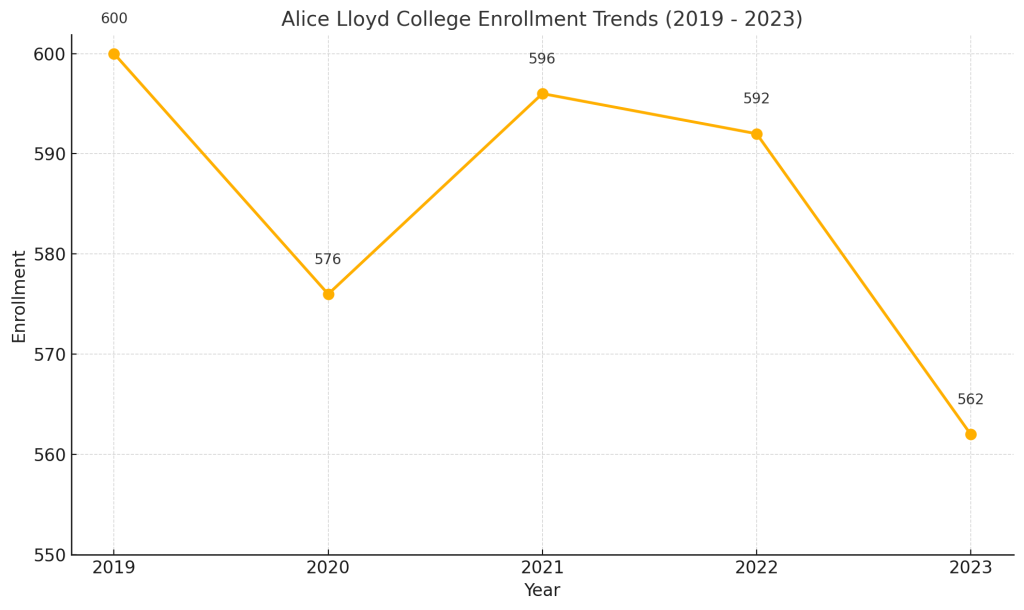
Graduation and Retention Rates
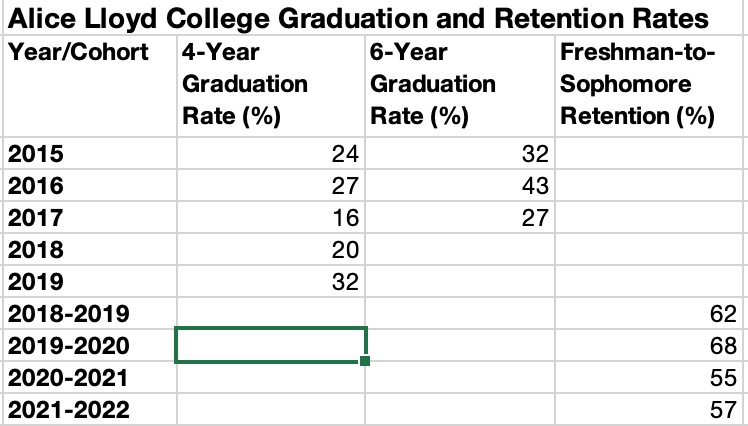
Source: Alice Lloyd College Student Achievement Report
The graduation and retention rates for private colleges are below both national and regional averages. The National Student Clearinghouse Research Center reports that private nonprofit institutions have an average six-year graduation rate of 68%. In Kentucky, the average six-year graduation rate for private colleges is approximately 52.5%. For freshman-to-sophomore retention, the national average is 75%, and Kentucky is about 79%.
Alice Lloyd College’s graduation and retention rates reflect its explicit mission to serve Appalachian students facing significant socioeconomic, geographic, educational, and cultural barriers. Many students are first-generation, with limited financial resources and weaker academic preparation. The institution’s rural location limits access to employment, internships, and support services common in urban areas. Additionally, strong family obligations in Appalachian culture can disrupt students’ academic progress. The college’s pronounced commitment to educating high-risk students partially accounts for lower retention and graduation rates relative to national and regional averages for private nonprofit colleges.
Degrees Awarded by Major
In 2022- 2023, Alice Lloyd College conferred degrees as follows: 92 seniors graduated. In the Class of 2022, 50% are working (all in Appalachia), 45% are in graduate or professional school, 2% are in the military, and 3% are unemployed 6 months after graduation.
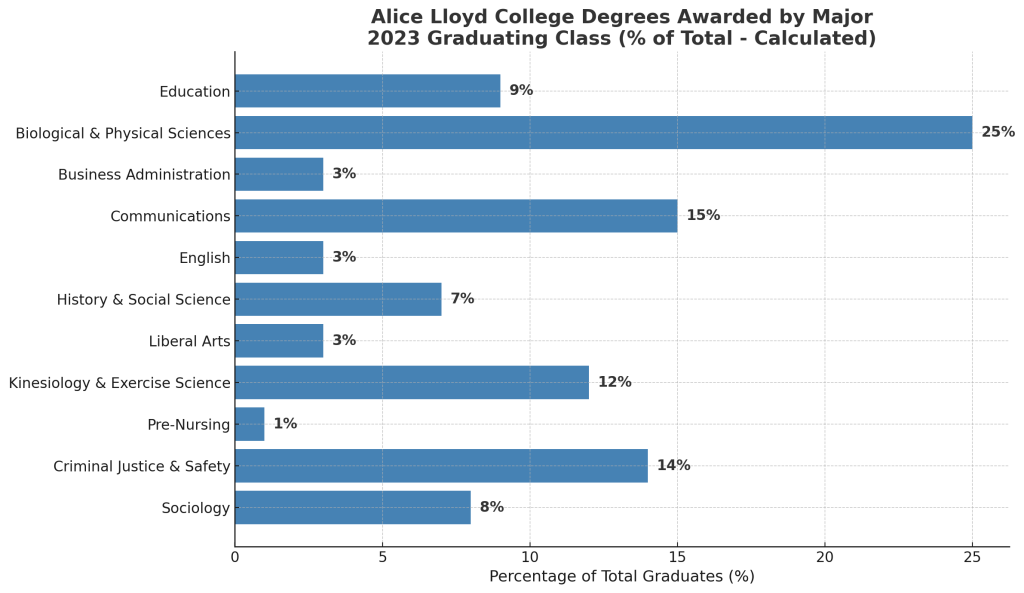
Alumni
Alice Lloyd College boasts an alumni network committed to community service, leadership, and regional development, with graduates frequently occupying influential positions in education, healthcare, business, and public service within Appalachia. According to LinkedIn, which has 1,169 alums registered, of which 704 live in Kentucky.
Notable alumni include:
- Carl Perkins ( attended in the early 1930s) House of Representatives 1949 – 1984 Known for his advocacy of higher education, including the Carl D. Perkins Career and Technical Education Act, which focuses on improving career and technical education programs
- Dr. Clyde Thornsberry (39) Centers for Disease Control, where he gained a national and international reputation as a scientist and expert in several fields, including microbiology and infectious diseases.
- Dr. Warren Grady Stumbo (65) is a Distinguished physician and public servant from Eastern Kentucky.
- Preston Spradlin (09) Head Basketball Coach James Madison University
Endowment and Financial Standing
Alice Lloyd College maintains a modest yet healthy endowment, valued around $60 – $70 million. Financial stability remains reliant mainly on consistent fundraising efforts and prudent asset management. Forbes 2023 Financial Health Evaluation gives a GPA of 3.463 out of 4.5 and a grade of A-. This reflects Alice Lloyd College’s fiscal responsibility, with continued positive ratings from financial health assessments.
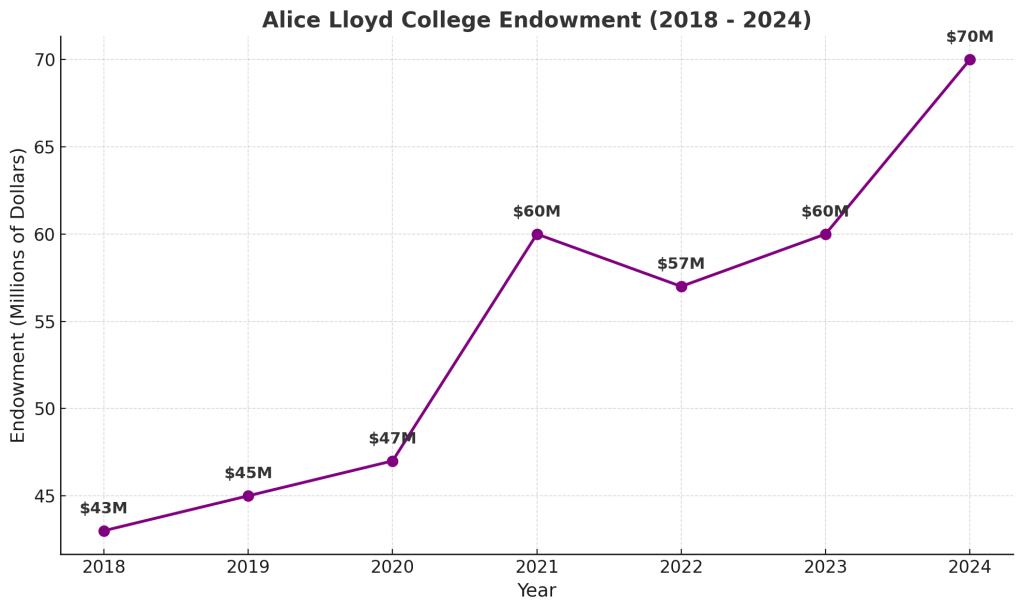
Why is Alice Lloyd Important?
- Strong Regional Commitment: The college addresses Appalachian educational disparities and actively contributes to the region’s long-term economic and social well-being.
- Providing Tuition-Free Education: ALC significantly reduces financial barriers for Appalachian students, enabling higher education access for underserved populations.
- Community Development: The college nurtures local economic and social growth by educating regional students who return as impactful leaders.
- Innovative Work-Study Model: ALC’s mandatory Student Work Program teaches graduates practical workplace skills and instills a strong work ethic.
Alice Lloyd College is a unique school that fulfills its mission to educate mountain people for positions of leadership and service to the Appalachian region. 98% of its students come from the region, and 83% of its alumni return to live, work, and serve in the Appalachian region.
Dean Hoke is Managing Partner of Edu Alliance Group, a higher education consultancy, and a Senior Fellow with the Sagamore Institute. He formerly served as President/CEO of the American Association of University Administrators (AAUA). With decades of experience in higher education leadership, consulting, and institutional strategy, he brings a wealth of knowledge on small colleges’ challenges and opportunities. Dean, along with Kent Barnds, are co-hosts for the podcast series Small College America.

